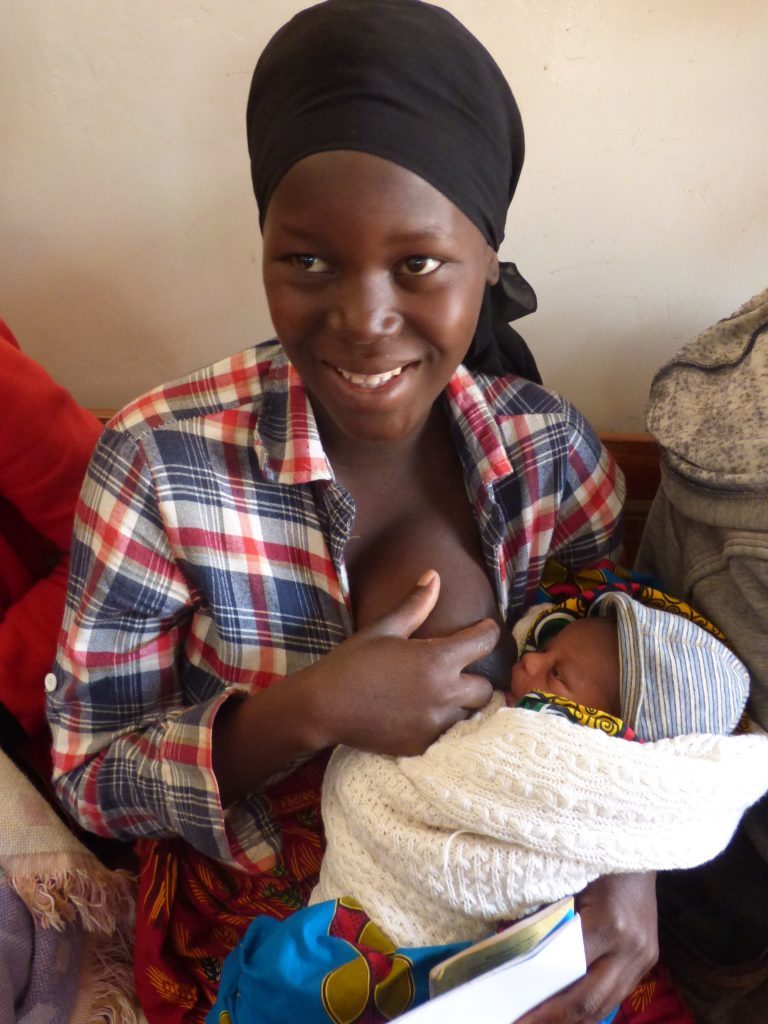Respectful Maternity Care Can Lead to Successful Breastfeeding: A Win for Mother and Baby
 As maternal-newborn health advocates recognize the importance of breastfeeding during World Breastfeeding Week, we at White Ribbon Alliance thought it would be helpful to show how important our call for respectful maternity care is for successful breastfeeding. This connection isn’t necessarily obvious, even to those who are considered respectful-care or breastfeeding experts.
As maternal-newborn health advocates recognize the importance of breastfeeding during World Breastfeeding Week, we at White Ribbon Alliance thought it would be helpful to show how important our call for respectful maternity care is for successful breastfeeding. This connection isn’t necessarily obvious, even to those who are considered respectful-care or breastfeeding experts.
This year’s theme, Breastfeeding: A Key to Sustainable Development, highlights the many benefits that breastfeeding presents to mothers, babies, and society. Beautifully put by the organizers, “Breastfeeding is a key element in getting us to think about how to value our wellbeing from the start of life, how to respect each other, and care for the world we share.”
We start with the premise that exclusive breastfeeding for the first six months of the baby’s life, and continuous support for breastfeeding and offering complementary foods thereafter, is best for the health of both mother and baby, a premise that is almost universally accepted after years of research and advocacy.
But did you know that providing a mother with respectful, dignified care during pregnancy, childbirth, and the immediate moments after childbirth can increase the chances that she will breastfeed her child?
The respect and dignity afforded a pregnant woman during pregnancy and childbirth is critical in ensuring that she feels supported during the first hours and days after giving birth, when the breastfeeding relationship is first established. When a woman gives birth in a respectful, supportive environment, where her rights are protected and her dignity preserved, she is empowered to take care of her baby and breastfeed.
These are the critical factors that respected, women-centered care provide for the initiation of breastfeeding:
- Freedom from harm and ill-treatment: Women should not be denied food and drink during childbirth or be separated from their babies without medical indication and separation should be avoided if possible even when there is a medical indication. Women and babies should remain together every hour of every day for the duration of their stay in the medical facility.
- Information and informed consent: Women should be provided with information about the benefits of breastfeeding to mother and baby, and enough information and support to successfully initiate and maintain breastfeeding. Breastmilk substitutes or pacifiers should not be offered without medical necessity and without the parents’ informed consent.
- Companionship: Companions – husbands, mothers, sisters, and others – should be present in postnatal wards to provide additional support and encouragement. Postnatal companions are critical to providing the support needed in establishing breastfeeding, especially in cases of surgical birth and multiple babies.
- Privacy: Ensuring privacy for the mother and baby dyad can aid successful initiation of breastfeeding. This is especially important in the first hour after birth when mother and baby should have an opportunity to spend time skin-to-skin, uninterrupted and get to know each other. Midwives have a key role in preserving the privacy of the mother-baby dyad in this critical time for both, offering them an opportunity to initiate breastfeeding for the first time.
- Dignity and respect: Women should be respected in their choices to breastfeed their babies – or not – and provided with support when needed to initiate, maintain, or reestablish breastfeeding or information on how to safely offer breastfeeding substitutes.
- Equality, freedom from discrimination, and equitable care: Breastfeeding is especially important in times of emergencies and conflict and when women are escaping with their children. Breastfeeding should be supported as a first line of defense in times of crisis and women should be provided with supportive advice on how to initiate, maintain, or restart their milk supply (yes, this is possible!) in cases where breastfeeding was interrupted. Breastfeeding should be supported for women who have undergone surgical births or babies who were born prematurely. Mothers of prematurely born or sick babies might need additional support and encouragement to successfully breastfeed their babies. HIV-positive mothers on ARVs should be supported and encouraged to breastfeed.
- Healthcare and the highest attainable standard of health: In order to ensure successful breastfeeding in the facility and beyond, women need the support of knowledgeable providers who are trained to provide lactation support. Midwives are uniquely positioned to provide this kind of support and help women in initiating and maintaining breastfeeding. Exclusive breastfeeding, without any supplementary foods or liquids, should be encouraged for the first six months and breastfeeding with supplementary foods thereafter for as long as mother and baby desire to continue.
Above all, it is critical to support women and let them know that they can do this. Breastfeeding can be challenging, and by giving women the quality, respectful and dignified care they deserve, we will help more women succeed, ensuring more babies start their lives on the strongest footing possible. To achieve better health for all, we have to start from a place of respect for childbirth and the mother-baby dyad – this is the foundation for a satisfying and empowering breastfeeding experience.
For additional information:
- WHO, Infant and Young Child Feeding, Fact sheet
- MCSP, Postnatal Care for Mothers and Newborns, Highlights from the WHO 2013 Guidelines
- UNICEF, Ten Steps to Successful Breastfeeding
- WHO, Breastfeeding in Emergencies: A Question of Survival
- Improvement of maternal and newborn health through midwifery
- WHO, Guidelines on HIV and Infant Feeding 2010
- Healthy Newborn Network
Featured Image by White Ribbon Alliance.


